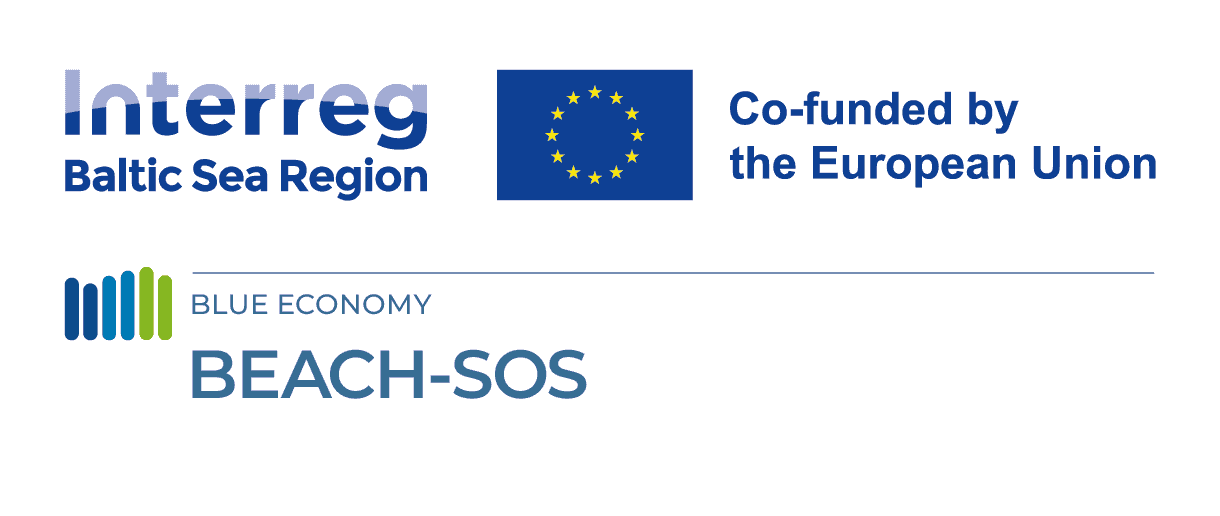Workshop: Forging Coastal Resilience & Sustainable Tourism
Project: BEACH-SOS
Physical Meeting
08. May 2025
10:00 - 16:00 (BST)

Climate change is reshaping beaches and beach tourism in ways scientists can now measure and document. Rising sea levels are causing beaches to narrow, giving visitors less space to enjoy the coast. More frequent and powerful storms are damaging coastal buildings, boardwalks, and beach access points. Weather patterns are also shifting—with more rain or extreme heat reducing the number of comfortable beach days. In some areas, changes in water temperature and ocean currents are temporarily affecting water quality, making it less safe for swimming.
These combined changes affect when and how people visit beaches, disrupt the busy summer tourism season, and create challenges for coastal businesses and local governments that depend on beach tourism for jobs and income. Planning ahead and adapting to these changes is essential to keep Baltic Sea beaches thriving for future generations.
The BEACH-SOS project had a special mission – to help coastal municipalities, businesses, and local communities prepare for the changing climate.
Why was this important? The beaches along the Baltic Sea aren’t just lovely places to visit; they’re a significant part of the EU Blue Economy. The coast and its state of conservation are essential to provide jobs and income for lots of people—more than 330,000 jobs around the Baltic countries.
Beach tourism is highly sensitive to the climate, which means changes in the weather and environment can cause serious problems. The big challenge was that climate change brought all sorts of risks that could affect the beach business.
Dealing with these challenges required a plan. The issue was that climate data was like an incomplete puzzle—hard to find, comprehend, and use for decisions. This resulted in a critical problem: many people were unaware of upcoming climate changes and how to prepare for them.
And this is where BEACH-SOS came in. The project worked in Latvia, Denmark, and Germany with a clear goal: to help local governments, businesses near the coast, non-profit organisations, and coastal communities adapt to climate change and become “climate-smart”.
Key Achievements
BEACH-SOS delivered a community-based climate adaptation model built on four interconnected strands of work that brought together science and local knowledge.
Climate-Smart Indicators: The project co-developed a set of 25 physical and socio-economic indicators with coastal communities, municipal authorities, and EUCC-The Coastal Union Germany. These indicators—including coastal erosion rates, storm surge frequency, sand temperature, and beach biodiversity—were validated in stakeholder workshops held in Warnemünde (Germany), Saulkrasti (Latvia), and Køge Bay (Denmark). The workshops united scientists, tourism operators, municipal staff, and NGOs to ensure each indicator’s scientific soundness and practical applicability.
Community Action Plan (CAP): In Saulkrasti, Latvia, BEACH-SOS established a participatory roadmap for climate-resilient beach tourism. Through four stakeholder workshops involving over 150 participants—residents, entrepreneurs, and policymakers—the project co-designed local adaptation visions ranging from “A Sanctuary of Nature” to “A Year-Round Destination.” The plan addressed climate impacts such as sea-level rise and extreme rainfall, combining local knowledge with European climate data to build a phased adaptation strategy for 2050.
Climate Change Adaptation Pathways Guidelines: The project co-developed practical, strategic frameworks for municipalities to plan and implement climate adaptation actions. Co-created by coastal communities in Latvia, Denmark, and Germany with support from the Climate Service Center Germany of the Helmholtz-Zentrum Hereon, this guide supported local authorities in scenario planning, risk assessment, action prioritization, and monitoring mechanisms. It provided stepwise pathways to address evolving climate challenges in a flexible, evidence-based manner, designed specifically for Baltic Sea coastal municipalities and tourism resilience.
Knowledge Exchange and the E-Repository: Led by FEE Latvia, the BEACH-SOS project produced a wide range of communication and awareness-raising materials, including guidelines, story maps, and adaptation tools. These outputs were integrated into the Baltic Sea2Land Navigator—a digital platform that serves as a knowledge hub for municipalities, schools, and NGOs across the region, providing public access to tested methods, practical tools, and examples of best practices for coastal adaptation.
BEACH-SOS brought together regional experts, local practitioners, and community-based stakeholders across the Baltic Sea Region, building trust between communities where climate threatens the beach industry, climate risk and adaptation experts, and tourism service providers. The project established a foundation for securing the region’s beach tourism industry and significantly benefiting the region’s blue economy.
Project: BEACH-SOS
Physical Meeting
08. May 2025
10:00 - 16:00 (BST)
Project: BEACH-SOS
Physical Meeting
11. March 2025
09:00 - 13:00 (BST)
Project: BEACH-SOS
Physical Meeting
08. - 09. October 2024
10:00 - 13:00 (BST)
Project: BEACH-SOS
Physical Meeting
02. - 04. June 2024
00:00 - 23:59 (BST)
Project: BEACH-SOS
Physical Meeting
02. May 2024
09:30 - 15:30 (BST)
Project: BEACH-SOS
Physical Meeting
12. April 2024
09:00 - 13:30 (BST)
Project: BEACH-SOS
Physical Meeting
23. - 26. January 2024
00:00 - 23:59 (EET)
Interactive map showing pilot locations. Use the arrow keys to move the map view and the zoom controls to zoom in or out. Press the Tab key to navigate between markers. Press Enter or click a marker to view pilot project details.